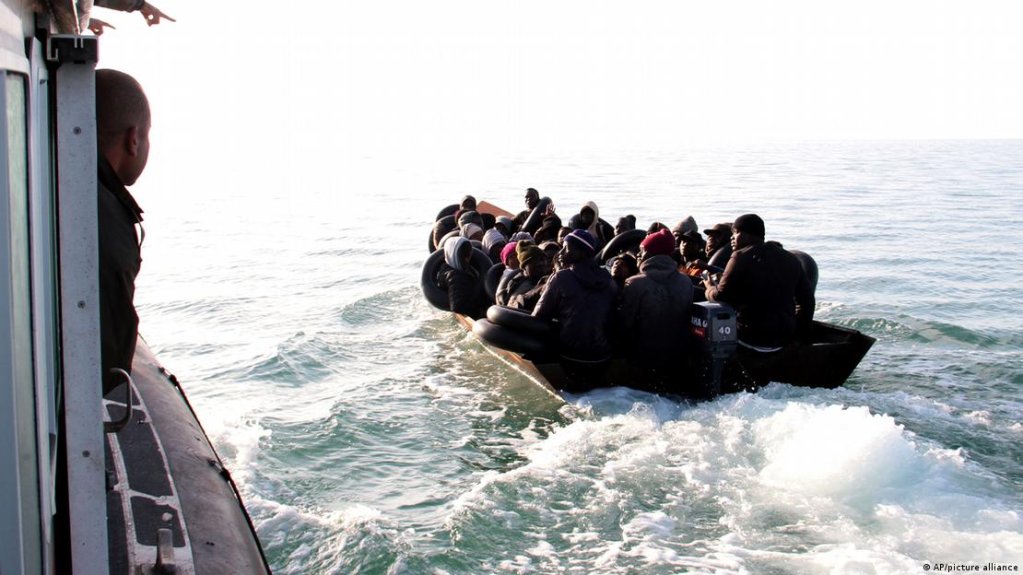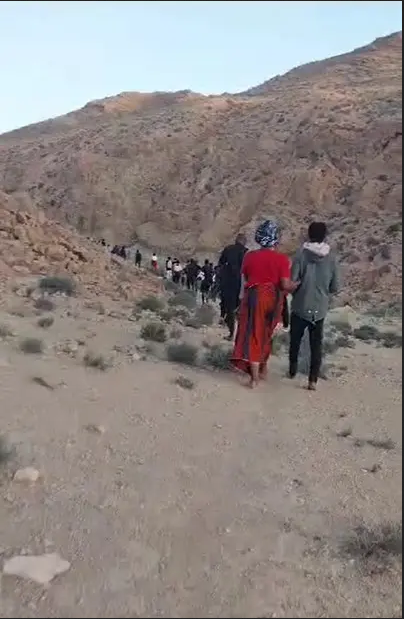A series of reports on the Italian online news website Fanpage.it since early November allege that the Tunisian coast guard "deliberately rammed a boat filled with 80 migrants," potentially causing the deaths of 52 people. It is a charge the Tunisian coast guard vehemently denies.
During the night of November 7-8, off the coast of Tunisia, a boat carrying around 80 migrants is reported to have been "rammed" by the Tunisian coast guard until it "capsized" and around 52 people drowned.
The rest of the group "were deported to the desert or sold to the Libyans", reports the Italian news website Fanpage.it, which regularly reports on migrant stories. The latest article on the website, dated November 19, is one of a series since the events are alleged to have taken place. The reports are based on testimonies from survivors of this and similar alleged incidents, and posts from the NGO Refugees in Libya, whose founder now lives in Italy.
The story was also reported in Middle East Monitor on November 21. That news website reports they spoke to Tunisian opposition member and migration activist Majdi Karbai, who also claimed that a migrant boat had been rammed by the Tunisian coast guard, part of the Tunisian navy, and that 52 people died during the collision.
Karbai, a former Tunisian MP who is frequently based in Italy, reportedly claimed that "the survivors stayed at sea until a Tunisian fisherman rescued them and handed them over to the coast guard to hand over to Libyan security forces."
Fleeing Sudan
According to Fanpage, the boat carrying around 80 migrants was about 19 kilometers along the coast away from Sfax and already a few meters into the water. On board were around 20 women, 13 of whom were pregnant, children, unaccompanied minors and men.
Mohammed*, a Sudanese living in Sfax, told Fanpage.it that his cousin Musa* is thought to have been on board the boat in question.
"We waited for days for news from my cousin. He is just 16 years old and he fled war, like me, in Sudan. I know he left Tunisia to reach Italy, but the call we were expecting from him on arrival never came," Mohammed reportedly said.
Mohammed claims that when the boat was not far off shore, a Tunisian coast guard boat arrived to intercept the migrants. "The Tunisians arrived, they rammed the boat until it overturned, and then they watched them drown," says Mohammed. "My cousin Musa is one of the minors who died that night, along with 52 other people."

Mohammed also claims that a woman and her three-year-old child were among those who died that night and that the Tunisian coast guard "let them drown."
This summer, Italy delivered three out of a promised fleet of six motorboats to the Tunisian coast guard. Officially, the boats are to "reinforce search and rescue efforts and to fight against human trafficking," stated the Italian government.
Fanpage.it prints the photos of four people, including Musa, who are believed to have died that night.
Read AlsoTunisia: Advocates for migrant rights held in 'anti-terrorism' investigation
Local fishermen intervene?
According to some of those who reportedly survived this incident, local fishermen intervened and helped pick up some people from the water. At least 23 people were saved in this way, although later the Tunisian coast guard came and forced the fishermen to bring the people back to Sfax and turn them over to the police.
Mohammed claims that once the group was returned to Sfax, one group was taken to the desert and "abandoned" and another group was "sold to the Libyans." Mohammed says friends of Musa, who were with him that night told him what had happened.
The group that was allegedly abandoned in the desert includes the 13 pregnant women, claims Mohammed, who were left "without food and water." The group "sold" to the Libyans is allegedly now in prison in Al Assah in Libya, on the border between Tunisia and Libya. This prison, reports Fanpage, is "known for selling human beings."

Alice Basiglini, from the Italian association Baobab Experience, which supports migrants in Italy, says Mohammed’s story is similar to many others the organization has heard from migrants in Tunisia, or who have passed through that country.
Basiglini tells Fanpage.it that they have been monitoring what happens in Tunisia to migrants for "more than a year." Basiglini adds that "just a day before [the incident that Mohammed alleges] another boat was sunk by the Tunisian coast guard, and some people died, although we don’t have names, or even bodies to pick up and cry over."
'Constantly in danger'
Mohammed tells Fanpage.it that he is still in Sfax, but his life is "constantly in danger. We don’t know for how long we can survive like this. Anyone who is not mentally strong, risks being pushed into committing suicide in Tunisia," claims Mohammed.
On November 9, the same Fanpage journalist Lidia Ginestra Giuffrida spoke to a group of migrants who said they had been abandoned in the desert. "It is cold here, and the children are hungry," the group told her. "We need help, please save us," they continued.
A picture published on the news site shows several women, some children and men standing in what looks like a desert area somewhere in North Africa. This group though, reported Fanpage had already been in the desert for six days, so before the alleged incident that Mohammed reports.
In this group, according to Fanpage.it, the group comprises 18 people, including six men, eight women, of whom three are pregnant, several children and two newborns just two and four-months old.
Read AlsoStuck in limbo: Tunisia's suspension of asylum procedures leaves migrants stranded
'We haven't got any food or water'
"We haven’t got any food or water," screamed two of the people over a bad phone connection to Fanpage.it at the time. This group, reported the newspaper, came originally from Sierra Leone. The group also contacted the group Refugees in Libya.
InfoMigrants too has received similar photos and videos from sub-Saharan African migrants who say they have been pushed into desert areas in Tunisia by the authorities there, and left without food or water. They too claim that often they are beaten and have had their phones removed, but then send photos and videos from phones they still do have.
This group too, told Fanpage.it that they were "in the middle of the sea when the Tunisians arrived, stopped us and forced us to return to Tunisia. As we were headed back, the Tunisian coast guard hit us hard, confiscated our telephones and our money and took everything that we had," said the group. Seboté, one of the six men in the group told Fanpage that after that experience they were "abandoned with nothing in the desert," although they clearly have at least one mobile phone between them, because the group sent pictures and videos to Refugees in Libya.
The group said they tried to return to Sfax, but were intercepted once again and transported even further away. "We walked for six days back and forth," Seboté told Fanpage.it.
Read AlsoTunisia under harsh criticism for anti-migrant measures
Denial
David Yambio, the founder of Refugees in Libya, who now lives in Italy, where he has been granted protection, told Fanpage.it that he has received "hundreds of these types of stories" over the last year.
"We receive similar calls daily, there are women and children here, where is the respect for human rights?" asked Yambio rhetorically.
The Tunisian coast guard, via Tunisia’s Interior Ministry, has vehemently denied all of these allegations. In a statement provided to the French international broadcaster France 24, a spokesperson for the National Guard, Houssam Eddine Jebabli, said that the stories reported in the Italian press were "incorrect."
Jebabli said there had been no collision between a coast guard ship and a migrant boat registered on the night of November 7-8. He also added that the coast guard is regularly called by migrants in distress and goes to those calls to help save people and prevent them from drowning.
*Name has been changed by Fanpage.it to protect his identity
